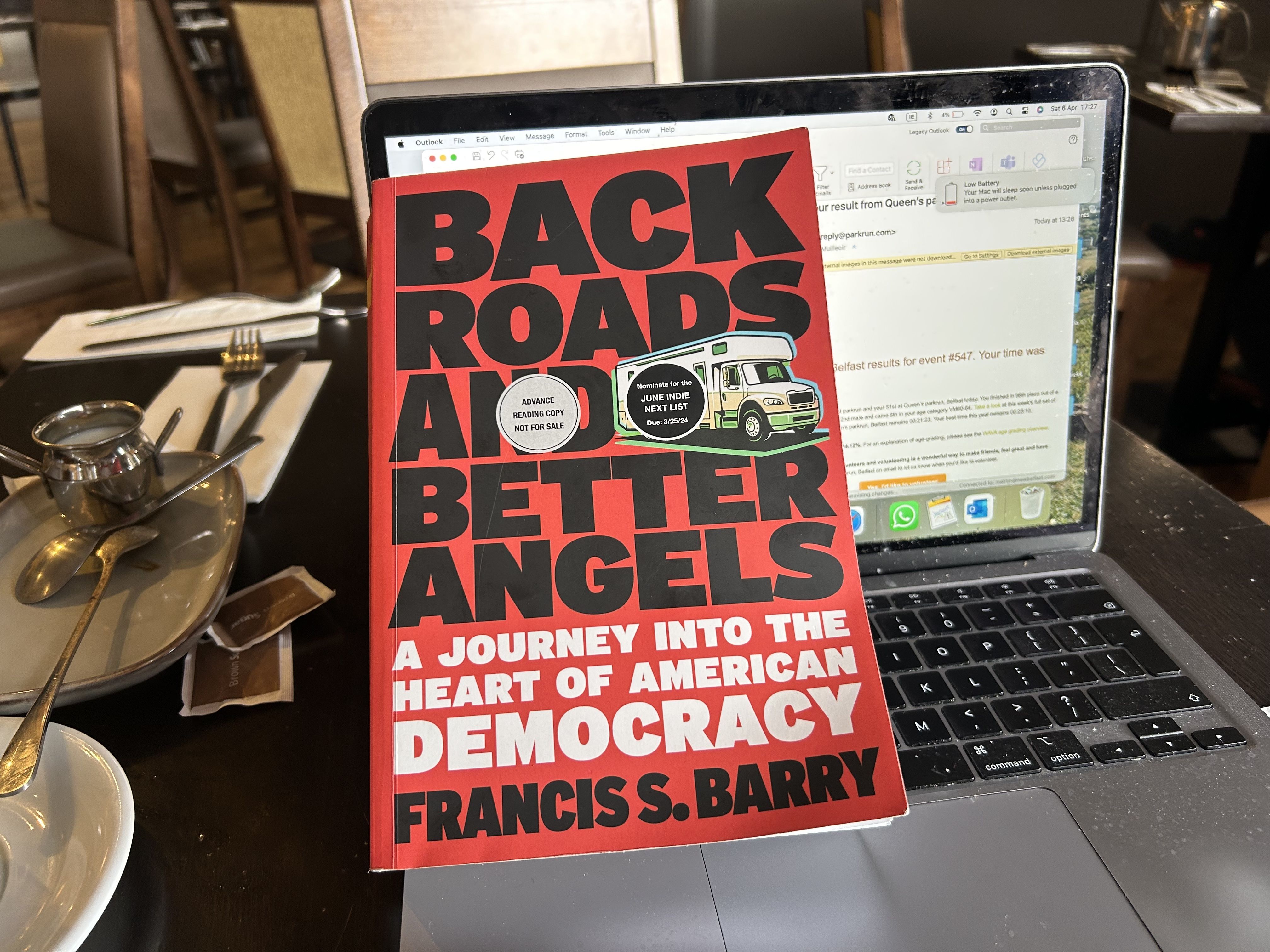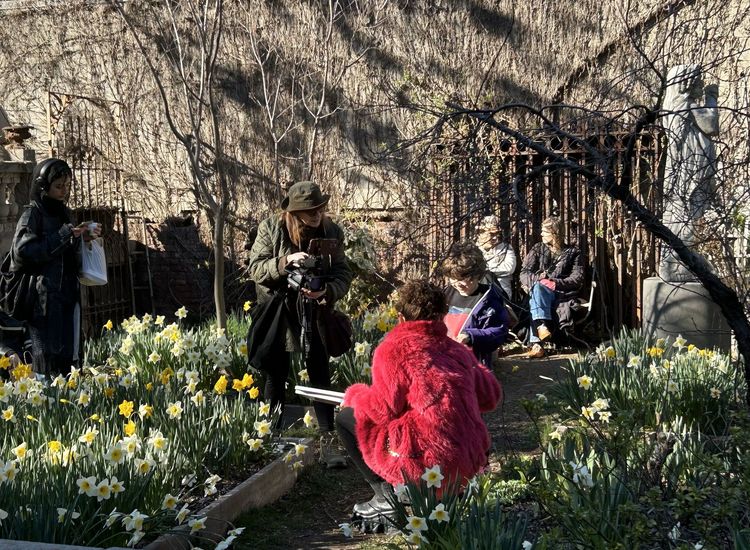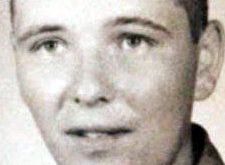My DUP buddy Sammy Douglas enjoys getting up in front of American audiences visiting Belfast and telling them, in somber tones, that he is here to talk about a country riven by division, polarised by hate and walking a thin line between democracy and authoritarian rule.
"But enough about America," he laughs before bigging up the New Belfast.
I thought often of that wisecrack when riding along The Lincoln Highway with Frank Barry on his epic, COVID-era trek across myriad states (both of mind and geographic) "to look for America".
Accompanied by his wife, co-driver and comedic foil Laurel, former Mike Bloomberg speechwriter Barry points his Winnebago christened (we can still say that?) Charley — in a nod to John Steinbeck's trusty steed — west from Times Square, New York. For it's here, unbeknownst to all but the true history anoraks, that the eponymous route begins. In truth, the Lincoln Highway - an often imaginary road stretching from coast to coast and dreamt up by car company boosters in the 1910s to create a level (and paved) playing field for early automobile owners — is as good a hook as any to hang a travelogue on. And given the author's penchant for America's storied past, warts and all let it be said, it's more than just a Kerouacian device!
Roaming during Corona (the pair push off in September 2020) was, it turns out, the perfect time to take the American political temperature as responses to the pandemic split more evenly red and blue than even the State of Michigan in 2020. Full disclosure on the author's starting point: he's a Bloomberg fan (and still employee) which equates to a New York Democrat who has rarely cancelled more than the odd restaurant reservation — and even then not without fretting over the decision unduly.
But fair play, he's also an excellent listener in a country where loud voices - invariably amplified on "the socials" — trump respectful reflection. Which enables us to cozy up beside Barry as he meets a procession of real Americans, outdoors and socially-distanced of course, who open up to him on what binds and fractures the nation.
Standout interviewees for me were Steve Fulop, Mayor of Jersey city and Sadaf Jaffer, Mayor of neighbouring Montgomery Township. Jaffer, who holds a PhD in Islamic Studies, finds herself 'corrected' often on matters Muslim by know-nothings, while Fulop, who left GS post-9/11 to join the Marines, talks about battling misinformation about police 'brutality'. Two potent, articulate spokespersons for modern America — and we're not even out of New Jersey.
The Lincoln Highway boasts statues a-plenty of the great man himself but of course, as Charley trundles southwards there's no lack either of Confederate monuments. Most of these tributes to the grand 'Lost Cause' leave Barry speechless though by journey's end, post-6 January and the D.C. putative putsch, his cup fairly boileth over at the bare-faced revisionism — lies to me and you — of the plinth scribes. ON THE BURNING GROUND: Charley in Utah. Pic by Frank Barry.
All due respect to GPS, but Barry's true North Star on this journey is Lincoln himself. He quotes the Civil War victor often, tipping a hat to his generosity towards his vanquished opponents but suggesting his leniency nurtured the rebirth of Dixie. The author laments the fact that Lincoln's war to free the slaves was won only to be lost before being, largely, won again. Of course, for America's Blacks, a miserable century-long purgatory divided those two triumphs.
Our heroes motor west, through the heartland, to Chicago and Cheyenne, to the plains where the Indian native peoples were slaughtered, to Salt Lake City where the Mormons created a temple in the desert, but afterwards erased the role of slaves in their 'emancipation', to the Wild West of Wyoming and Nebraska where their COVID masks attract derision, and eventually, and you suspect, thankfully, to that liberal El Dorado known as San Francisco.
There their wandering would have ended but for the audacious and shameful refusal to honour that most precious of American traditions - the peaceful handover of power after the November 2020 election was declared for Biden. Running on the fumes of their own fury at the rumbling discontent stoked by President Trump in the weeks and months following his electoral loss, the couple plough home via New Mexico, Texas and Alabama.
Indeed, this is a much better book for that rousing finale. Barry, in a Beckettian "can't go on, must go on" worthy of his Irish roots, reaches even higher in the home stretch. Surely his visit to the Lynching Memorial in Montgomery, AL, is the most poignant pit-stop on his odyssey. "Laurel and I are overwhelmed by it," writes Barry. "Eight hundred weathered-steel blocks — many of them hanging from steel poles that drop like ropes — hold the names of nearly forty-four hundred black Americans lynched between 1877 and 1950. And how many lynchings are unaccounted for?" The work of civil rights attorney Bryan Stevenson and Irish American architect Michael Murphy, the memorial and its sister institutions in the Alabama State capital chronicling the crucifixion of Blacks soar like the Better Angels Barry sought on the backroads of America.
So what is the author's grand conclusion about the mystery of what makes America? For the answer to that question, you will have to read the book for yourself. Better still take your own road trip into the heart of America and ask why in such a magnificent country so many still sing, "I'm empty and aching and I don't know why."
Back Roads and Better Angels: A Journey Into the Heart of American Democracy. Francis S. Barry. Steer Forth Press. (Publication Date 4 June)








